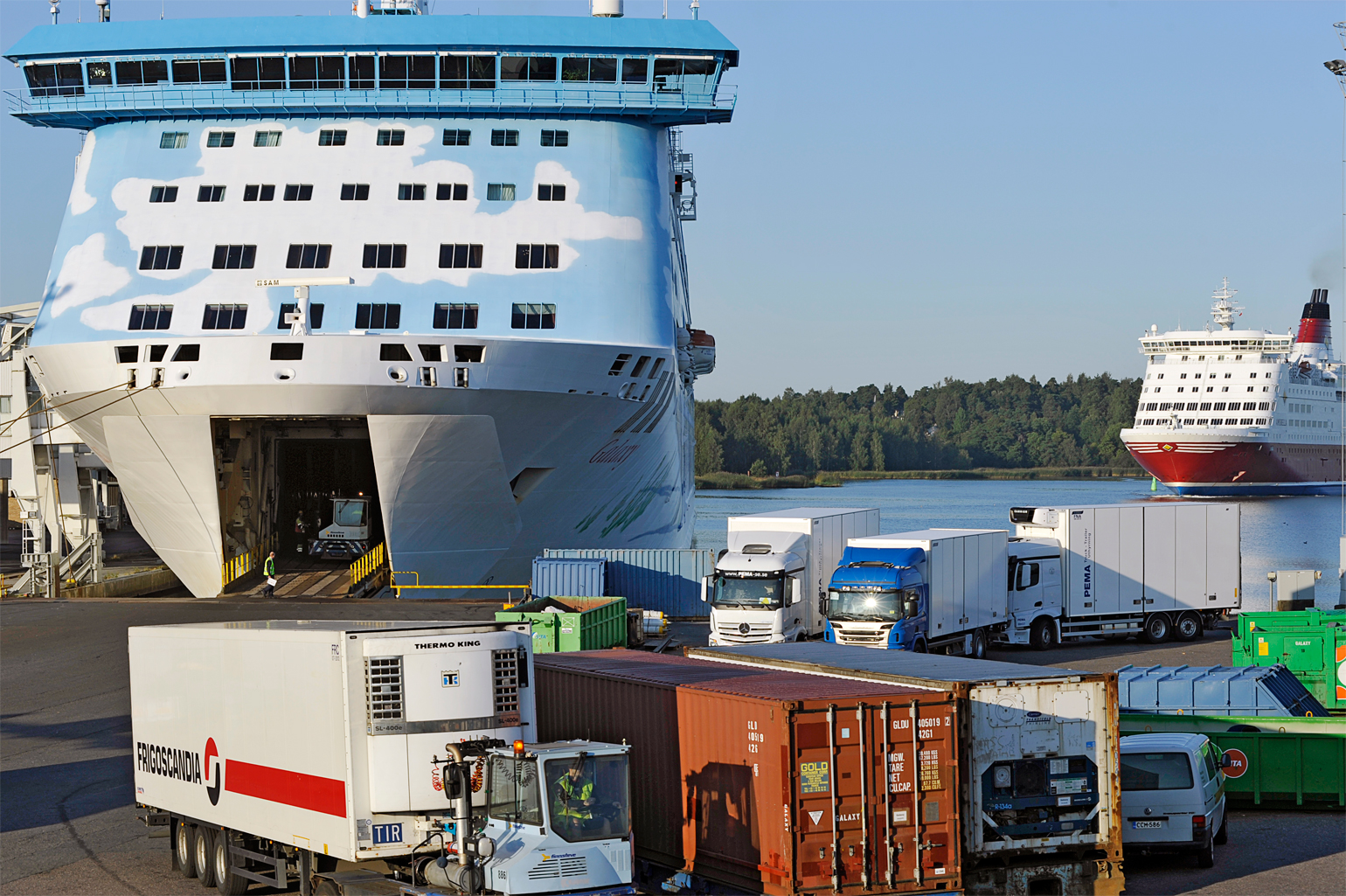Stay in the port is the busiest time for ferries to Sweden
The Port of Turku offers the fast sea route from Finland to Sweden, but the speed comes with a price. As the route is operated at a frequent schedule, the time for the port calls is just one hour.

The short stay in the port challenges the shipping companies and port operators to work on a minute-by-minute schedule in which everything has to go smoothly and quickly.
The route between Turku and Stockholm is operated by Tallink Silja and Viking Line. Both shipping companies have two ferries that sail daily on morning and evening departures. The schedules of the ships have been planned so that the interval between arrival and departure is long enough for the unloading and loading carried out during the stay, and for ensuring the smooth flow of traffic to and from the port.

For passengers speed means easy travelling
Viking Line carried last year over 1.9 million passengers on its Turku–Stockholm route. The volume makes it the market leader on the route with over 58% share of all passengers. According to the company’s Regional Manager Riikka Arola, the route from Turku is strategically important for Viking Line, due to which the service level is continuously developed to overcome the schedule-related challenges.
”The vitality of the Turku route is based on regular and frequent traffic, the smooth flow of which is ensured by continuous work. Our newest ship Viking Grace was designed from the beginning to suit fast-paced traffic, so that all routines can be completed as easily as possible during the short port call. The loading of cars is speeded up by the possibility to drive in both through the stern gate and the side of the ship. The embarkation and disembarkation of passengers has been enhanced by renovating the terminal. The number of skyways was doubled and all of them were equipped with convenient moving walkways. Together with the Port of Turku we have also improved the traffic arrangements on our field area to enhance the traffic flow and safety”, Arola says.
Each moment in the port is full of action

Guiding the departing and arriving people and vehicles in the right direction is not the only task, and often not even the most demanding one that needs to be performed during the short stay in the port.
”Simultaneously with guiding the passengers we have to take care of the ship’s waste management, drain waste water and fill the water tanks, take out the laundry and supply provisions. It’s a busy time in cleaning, too, although we have 50–120 cleaners working depending on the shift. As there’s only 40 minutes time for cleaning in the port, it is challenging to get all the cabins completed before the new customers come in”, says Riikka Suurkaulio and reminds that all measures mentioned above are carried out daily at both ends of the route. In the Port of Stockholm, the ships are bunkered which also takes its time.
Current schedule doesn’t allow for new speed limits
Fitting all different functions together is like a big puzzle in which every detail is important when looking for the smoothest solution for keeping to schedule satisfactory to all parties involved.
”Thanks to good planning and personnel committed to the tight schedules, we have managed well to keep our schedules. Sometimes we have to wait a little for passengers arriving by coach or train, but the principal rule is to depart precisely on schedule. A future threat on route is a possible lowering of the speed limits of vessel traffic. We hope that it will not happen, because it’s in practice impossible to win back the lost time on the brief open sea passages along the route. In that case it would be difficult to stick to the schedule with two daily departures”, stresses Viking Line’s Regional Manager Riikka Arola.
”Thanks to good planning and personnel committed to the tight schedules, we have managed well to keep our schedules.”
Smooth cargo transports are supported by favourable scheduling
The importance of careful planning and experience to functioning port operations during the short port call is also emphasised by Tallink Silja Oy’s Sales Manager Marina Hasselblatt.
”Keeping to the tight schedule requires careful planning and anticipation already in the booking phase. The number of cargo units varies depending on the day from five to as many as fifty units which have to be fitted in as per the requirements of passenger traffic. The needs of the passengers are usually fulfilled first, and the cargo transports can use the rest of the lane metres on the car deck. Cargo customers that use the route regularly are, however, promised a certain number of places which is adjusted from time to time according to the customer’s needs”, says Hasselblatt.
Clear operating models ensure staying on schedule
Tallink Silja operates the route between Turku and Stockholm, morning departures on m/s Galaxy and evening departures on m/s Baltic Princess. The ships are the company’s newest; they are modern passenger car ferries, each of which has 900 lane metres of high space suited for cargo transports. Fitting the operations required by passenger and cargo traffic inside the timeframe of one hour can be done when the routines and ways of working are under control, and everyone knows their duty.
”A key role is played by the field supervisor who guides all traffic in and out of the ship. The person is there for the whole time the ship stays in the port, books the stevedores, and sees to it that there is the right number of other field staff in the right place at the right time. To ensure smooth operations, clear communication between the vessel, field staff and check-in is also important. When information moves fast, everything else usually does, too”, Hasselblatt reminds.
Flexible service speeds the entry of trucks into the ship

The schedule on the route between Turku and Stockholm is ideal for unit cargo transports between Finland and Scandinavia. Trucks coming e.g. from Helsinki can easily make it to evening departures from Turku, even if the loading takes place in the afternoon. They can move on from Stockholm before the morning rush hour, which allows for reaching a destination further away and there is still time to return on the evening departure from Stockholm. The driving day is used efficiently and the driver can get a nightly rest when the ship is at sea.
On morning departures, cargo consists mainly of trailers, although the number of trucks has increased. That is partly due to the cost-efficiency resulting from lower prices, but on the other hand, the morning departures are often better suited to trucks arriving from e.g. Norway and Denmark.
”Cargo transports are an important element of the business on our Turku route, and thus we aim to serve the transport companies and drivers as flexibly as possible. We help the drivers to get quickly into the ship, for example, so that they call us from the road, we fill out the necessary forms and issue the tickets ready for them. The travel is also speeded up by the Port of Turku’s excellent road connections, which were further improved with the renovation of Suikkilantie road. Now heavy vehicles can access all key directions quickly and without traffic jams, including the E18 motorway and the renovated Highway 8 which has largely been upgraded into motorway.”
Punctuality also helps in keeping to distribution schedules
In addition to speed, punctuality is important. As the time of departure is drawing near, part of the units can be left in the port, and as a general rule the ship waits for no-one. Keeping to schedules is very important especially to the customers that do not have stocks in Finland, but instead distribute the arriving goods directly to shops. Those companies often reserve manpower and equipment for unloading within a precise schedule. If the truck to be unloaded does not arrive within that time slot, the staff will move to the next location, and the costs resulting from the postponed unloading are usually borne by the transport company.
”Our job as a shipping company is to ensure by any means that such situations will not arise, and hence we do everything in our power to keep to the schedules. Short stays in the ports of Turku and Stockholm form the biggest challenge, but with the current schedules the departure and arrival are as certain and controlled as the sea voyage”, assures Marina Hasselblatt.
Text Kari Ahonen
Photos Markku Koivumäki, Robert Seger and Jouni Saaristo
